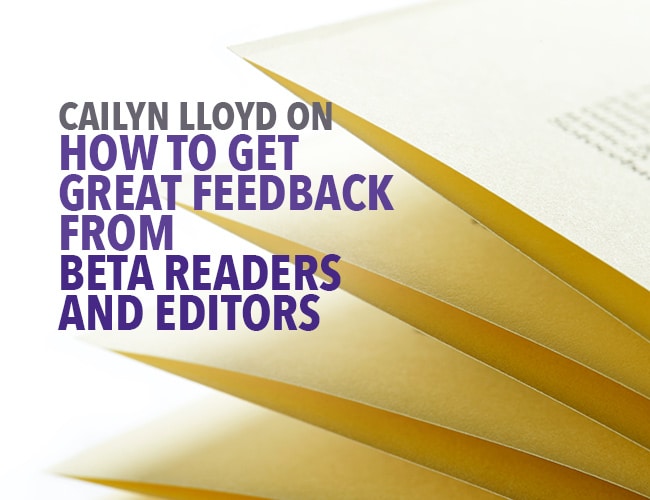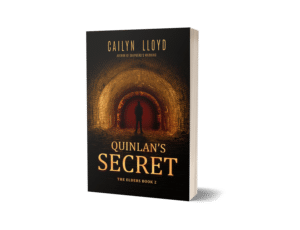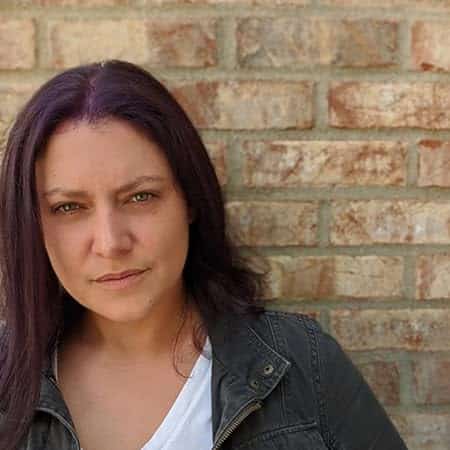At some point in your writing process, you're going to need to put your work into the hands of others. Beta readers and professional editors should be an important part of your writing team. (And yes, writing is a team sport!)

I often get a lot of questions about the revision process, namely how to get beta readers and when to hire a professional editor. Our interviewee this month is here to answer those questions!
Beta Readers vs. Professional Editors: What's the difference?
A beta reader is someone who reads your book in its entirety and gives you feedback on how the story is working. They aren't professional editors. It's not their job to catch typos and grammatical errors (though they sometimes will point them out) simply because they are most likely not trained to do so.
Think of a beta reader as a representative of the general public. In other words, just an average reader. Your team of beta readers are often people you know, but can be random people you find on the internet and other writers in your circle.
A professional editor is someone you hire to help you polish your book into something publishable. There are different categories for editors: developmental, line, and proofreading.
A developmental editor gives you macro-level insight into your entire story. They can really help you straighten out the kinks with major issues, like structure. You’d want to hire a developmental editor early on before you waste time doing several drafts. I’m talking after your first draft or between draft two and draft 2.5. Find out more about developmental editing through The Write Practice here.
A line editor is just what it sounds like: They comb through each sentence. A line editor’s specialty is language. These are the people to help you get beautiful prose. You’d hire a line editor after you’ve fixed major structural problems and anything else of high importance. They won’t help you fix your story, so that needs to be done first. This is third draft stuff. Find line editors we recommend here.
Finally, a proofreader is the person you want if you don’t know the difference between a comma and a semicolon. (Or if you can’t spell “semicolon.”) Proofreaders go through your manuscript with a fine-toothed comb and fix any typos, including spelling mistakes and grammatical and punctuation errors. They come in after your final draft, right before you publish. Find proofreaders we recommend here.
Now that you know the basics, let's see what Cailyn has to say!
Meet Cailyn Lloyd
A lifelong writer, Cailyn Lloyd spent three years living in a truly haunted house and experienced firsthand the nuances of strange and eerie places. Quinlan's Secret is her second novel, the highly anticipated sequel to Shepherd's Warning and the second in The Elders trilogy.
In addition to writing, Cailyn is an accomplished weather photographer. Her work has appeared in newspapers, textbooks and publications including Life Magazine. She is also a composer and musician with three album releases to her credit. Cailyn lives near the Kettle Moraine State Forest in Wisconsin and when she's not writing spooky stories, loves hiking with her dogs and hanging with her grandchildren.
You can connect with her social accounts and learn more about her and her work through her website.
Get to Know Cailyn's Work
Welcome, Cailyn! Let’s dive right into your work. You just released your second book in The Elders Series. Can you tell me a little about Quinlan’s Secret and your series in general? 
Quinlan’s Secret started out as a different book that refused to go anywhere until I tied it to my first book, Shepherd’s Warning. Once I saw the path to a sequel, the book virtually wrote itself.
The blurb for the book describes it best: After years of dreaming and saving money, Josh and Kiera open their own tavern in Miller's Crossing, a quiet town outside of Milwaukee. Owning a business is everything they imagined until Josh discovers a hidden door leading to a passage underground.
At first excited by the discovery, the couple quickly realizes the more they explore below, the more things unravel above. Friends go missing, apparitions appear, and their lives begin to crumble. With nowhere to run, Josh and Kiera soon find themselves in a fight for their very lives.
The Elders add a mysterious element to both books and figure strongly in the final story.
Beta Readers: What are they and how do you use them?
You’ve told me you used a handful of beta readers and several professional editors on these two books. First, in case people don’t know, can you tell us what exactly a beta reader is? Why is it important to have betas?
Beta readers fall somewhere between editors and family in the editing process. Our families often help by reading our books, but they seldom offer tough criticism, often concerned about hurting our feelings. Still, they often identify plot issues and can act as secondary proofreaders.
For people who may not be able to afford professional editing, beta readers are the next best thing. Not all betas are equal and it’s important to take their advice with that in mind. They are just one tool in the editing process.
Don’t panic if a beta writer criticizes your work or doesn’t like it. That’s just one opinion. Maybe that person isn’t a good match to your style.
On finding beta readers
How did you go about getting beta readers and at what point in the writing process do you use them?
Betas are anyone who will read your book. They can be random people found on Facebook and Twitter, members of a writing group, anyone willing to read your work and offer useful criticism. A google search will turn up many beta reader options.
I usually write three drafts and my editor and the betas will read all three. That way, I get great feedback all the way through the process. Sometimes you think you have a great idea and your readers will tell you otherwise. Or they will confirm your story is on the right track.
I listen to betas more early in the process and rely on my editor later on. In the end though, the story is yours and you have to decide how much you’re willing to bend.
On hiring professional editors
How about your editors? How did you find them and at what point did you start looking for them?
There are no easy answers to this question. There are plenty of editors advertising on the internet and it can be difficult to sort through all the possibilities.
I bookmarked the most interesting candidates, read their pages completely, and picked three who sounded professional and aligned somewhat with my philosophy on writing. The final pick for editor was a gut feeling and turned out to be the right choice for me.
This is the ideal. Find a good editor that you can work with and whom you trust. Once you find a good fit, hang onto that connection.
How to take feedback
Getting feedback is pretty tough for a lot of writers. Often the first instinct is to think whoever gave the feedback doesn't know what they’re talking about, especially with beta readers, who aren’t professionals. Do you ever want to ignore beta feedback? How do you take tough criticism?
Think of betas as regular readers. If they don’t understand something, or find something obtuse, maybe the passage needs more clarity. Of course you as the writer understand it. You wrote it.
If one person flags a passage, it may not be a big deal. If multiple people flag it, you need to ask why.
This is where an editor is critical. A good editor will elucidate why a passage isn’t working and perhaps suggest an alternative way to look at the scene. On the other hand, a good editor will never write or put words into your mouth.
How to apply feedback
Do you have any strategies (like this process) for applying the feedback you get from beta readers and editors to your revision process?
No. I parse each comment. Sometimes I’ll agree with the criticism, sometimes I won’t, but I try and understand their point of view. Even if I don’t agree with the critique, it still might trigger a thought, or lead to some improvement in the passage.
If I am concerned about a passage and the editors and betas also mention it, then I know I have a problem. There can be an inertia when we write. When you know something isn’t quite right but you resist attacking and rewriting it. Fight that inertia. Your writing is invariably better when you do.
Other writing tips
What’s the worst part of the writing process for you and how do you overcome that?
Proofreading. Editing can grow tedious but it’s a forward-facing process and leads toward a final result. At the proofreading stage, the book is done and you’re trying to parse the typos and silly errors that are far too easy to read right through. I hate it but it’s essential to the process. I just grin and bear it.
I paid a professional copyeditor and proofreader to go through Quinlan’s Secret. I then did two full readings myself and corrected further errors. After all of that, my daughter proofed the book and still found another dozen errors.
Any other writing tips you’d like to share?
Writing a novel is a huge undertaking. Don’t handicap yourself by believing you can do everything without help. Use beta readers to hone your writing but spend the money if you can for a pro cover, an editor, and a copyeditor. Look at sites like Fiverr for help. This book is your baby! Give it every advantage you can.
Mostly, just write. Everyone says that because it’s true. If you do nothing else, write every day, even if it’s only fifty words.
It’s a daunting process to write a novel no matter how exciting the idea is. I always feel intimidated by the process until I hit 30K or so. Then it suddenly feels doable. I strive for 1000 to 1500 words a day. Three months and you have a novel.
Take Feedback Graciously
It can hurt to get scathing criticism on your book, especially if you're at the point where you think it's close to publishing.
Even if your ego is a bit stung, remember to thank your beta readers for taking the time to read your book. They've done you a favor, after all!
Most importantly, be sure you take all the feedback into consideration, even if your first instinct is to dismiss it because it angers you. Take a breath, or a longer break, and come back when you've calmed down.
Betas (and editors!) are just trying to help your book be the best it can be. If the feedback truly leads in a direction you do not want to take your story, remember Cailyn's advice: In the end, it's your story and it's up to you how much you want to bend.
Thanks to Cailyn for agreeing to talk with me! Here's where you can find her latest book and don't forget to check out her website!
Do you have a dedicated team of beta readers? How did you go about forming that team? Let me know in the comments!
PRACTICE
Today's practice is an homage to Cailyn's new book. Set a timer for fifteen minutes and write on the following prompt:
Someone finds a hidden door leading to an underground passage.
Don't forget to share your writing in the comments. And give some love to your fellow writers by commenting on their writing!
Sarah Gribble is the author of dozens of short stories that explore uncomfortable situations, basic fears, and the general awe and fascination of the unknown. She just released Surviving Death, her first novel, and is currently working on her next book.
Follow her on Instagram or join her email list for free scares.




0 Comments